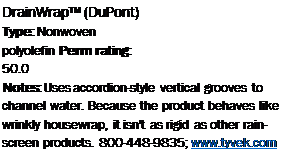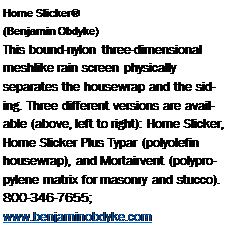Housewraps Are Susceptible to Certain Chemicals
Builders have debated the chemical compatibility of housewrap for years. Studies have found that certain types of wood siding, like cedar and redwood, leach surfactants (surface-active contaminants) that can affect the water resistance of housewraps. The surfactants reduce the surface tension of water, easing its ability to pass through microscopic openings in the membrane. To combat the problem, manufacturers recommend back-priming potentially troublesome wood siding with a water-repellent primer. In a
limited study, Fisette found that the newest version of Typar had superior resistance to surfactants compared to the performance of similar products.
In addition to the water-soluble extractives found in wood siding, the water resistance of housewrap also can be compromised by soaps, power-washing chemicals, and even some types of latex paints. The perforated variety is most susceptible, so consider choosing a high – quality, nonperforated housewrap.
It’s also important not to leave housewrap exposed for longer than necessary. House- wrap left uncovered for longer than its intended UV-rating will deteriorate and decline in performance, and should be
Housewrap Choices continued
Rain screen and housewrap combined
|
N |
o matter how tight the joints, how thorough the flashing installation, or how far the roof overhangs the walls, water always finds a way behind the siding of a house.
Housewrap or felt paper is a good safeguard for protecting sheathing and framing, but many builders also add a Уд-іп. to 3/8-in. drainage plane between the housewrap and the siding by tacking up vertical furring strips. This vented space allows moisture to dissipate naturally so that paint won’t peel prematurely, surfactants from the siding won’t be in contact with the housewrap, and bulk water won’t be trapped behind the siding with nowhere to drain.
 Several manufacturers have started combining the water-shedding benefits of rain-screen-wall construction with the ease of installation and the added benefits found in typical housewrap, creating a separate category sometimes referred to as “drainscreen.”
Several manufacturers have started combining the water-shedding benefits of rain-screen-wall construction with the ease of installation and the added benefits found in typical housewrap, creating a separate category sometimes referred to as “drainscreen.”
To the right are a few different designs that aim to accomplish the same basic task.
covered with a fresh layer before siding is installed.
Weatherproofing Comes with Workmanship
Here’s the bottom line: Installation is more important than material choice. No matter what brand of housewrap you choose, you will be wasting money unless the stuff is installed carefully.
Poorly installed housewrap will cause more problems than it solves. Getting the installation right is not hard, but it requires a basic understanding of how housewrap
works. Detailed installation instructions can be found on manufacturers’ websites and often at the lumberyard or home center where housewrap is purchased.
The basic installation premise is to think like a raindrop. Imagine a drop of water hitting the side of your house at the top of the wall. Gravity pulls the drop down along the face of the wall, and as long as all the courses, joints, tears, and penetrations are sealed and lapped in shingle fashion, the drop eventually will reach the ground. The moment that raindrop finds a puncture, a reverse lap, or an unflashed component, it will seep behind the housewrap and into the framing.

 |

Weather Trek®
(Berry Plastics Corporation)
Type: Perforated polyethylene Perm rating: 6.5 Notes: A clever nondirectional surface pattern (reminiscent of the texture of a basketball) ensures that water drains easily, regardless of orientation to the sheathing. 877-832-0333; www. berryplastics. com
GreenGuard
Raindrop®
(Pactiv Corporation) Type: Woven polyolefin Perm rating: 10.0 Notes: Relies on drainage channels woven into the surface to direct water down and out. Channels must run vertically to be effective. 800-241-4402; www. green-guard. com






Leave a reply